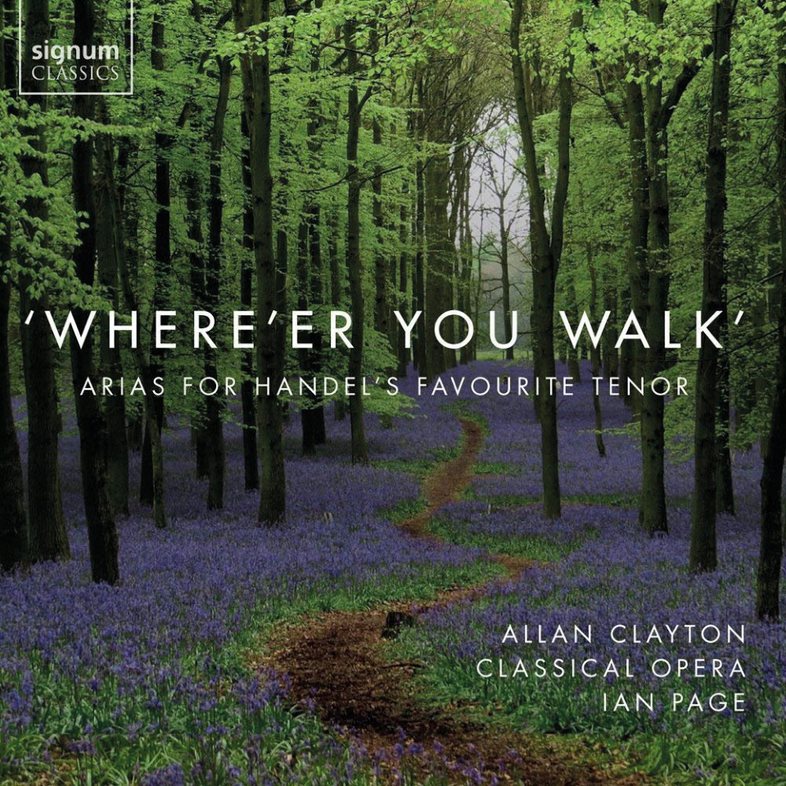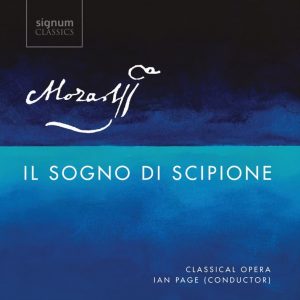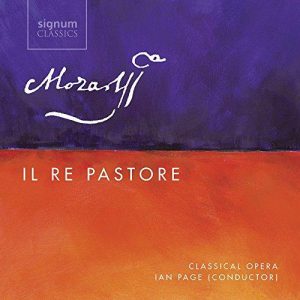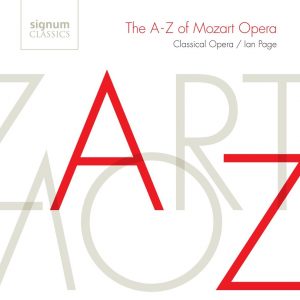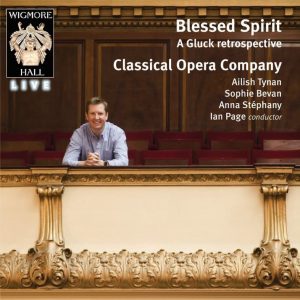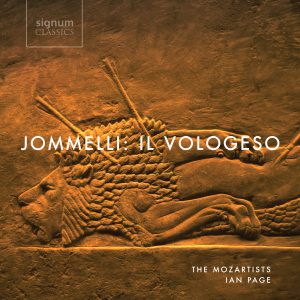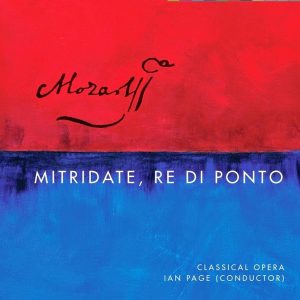“Clayton is the real thing: a great British singer who deserves to be championed.”
THE TIMES
“Where’er you walk” was recorded in September 2015 at All Saints Church, Tooting, and features Allan Clayton, Ian Page and The Orchestra of Classical Opera. It celebrates the life of John Beard, Handel’s favourite tenor. Beard created more Handel roles than any other singer, and this recording offers an exquisite overview of his career, featuring works by Handel, Arne, Boyce and J.C. Smith.
Allan Clayton became a Classical Opera Associate Artist and a BBC New Generation Artist in 2007, and is now in demand in many of the world’s leading opera houses and concert halls. This is his début solo disc.
To order your copy, please click the ‘Add to cart’ button or download a digital version from one of the sites below:
- Handel “Tune your harps to cheerful strains” from Esther 3.47
- Handel “Sol nel mezzo risona del core” from Il pastor fido 3.51
- Handel Sinfonia to Act 2 from Ariodante 1.06
- Handel “Tu vivi, e punito” from Ariodante 3.38
- Handel Recitativo, M’inganna, me n’avveggo” from Alcina 0.16
- Handel Aria, “Un momento di contento” from Alcina 4.09
- Handel Air, “Happy pair” from Alexander’s Feast 2.11
- Handel Chorus, “Happy pair” from Alexander’s Feast 2.19
- Handel “Vedi l’ape che ingegnosa” from Berenice4.35
- Handel “As steals the morn” from L’Allegro, il Penseroso ed il Moderato5.50
- Boyce Sinfonia to Part 2 from Solomon2.32
- Boyce Recitative, “My fair’s a garden of delight” from Solomon 0.22
- Boyce Air, “Softly rise, o southern breeze” from Solomon 3.20
- Boyce Chorus, “Ye southern breezes gently blow” from Solomon 2.02
- Handel Recitative, “Let but that spirit” from Samson 0.38
- Handel Air, “Thus when the sun from’s wat’ry bed” from Samson 3.48
- Handel Recitative, “‘Tis well, my friends” from Judas Maccabaeus 0.34
- Handel Air, “Call forth thy pow’rs, my soul, and dare” from Judas Maccabaeus 1.42
- Handel Air, “Hide thou thy hated beams, O sun, in clouds” from Jephtha 2.30
- Handel Accompanied recitative, “A father, off’ring up his only child” from Jephtha 0.21
- Handel Air, “Waft her, angels, through the skies” from Jephtha 4.13
- J. C. Smith “Hark how the hounds and horn” from The Fairies 5.05
- Arne “Thou like the glorious sun” from Artaxerxes 4.50
- Handel Recitative, “See, she appears” from Semele 0.39
- Handel Air, “Where’er you walk, cool gales shall fan the glade” from Semele 4.41
John Beard’s career on the London stage
John Beard (c.1715-1791) is commonly described as Handel’s longest-serving singer, and this description is paradoxically both fair and misleading. The English tenor sang a plethora of roles in Handel’s performances of theatre works on an almost annual basis for a quarter-century, the repertoire comprising Italian operas and unstaged English works such as oratorios (both dramatic and not-so-dramatic), odes, classical dramas and other less conveniently classifiable entertainments. However, the present collection of music associated with Beard attempts to reveal a more nuanced portrait of his long and varied career on the London stage.
The biographer Neil Jenkins conjectures reasonably that Beard was probably seventy-five years old when he died on 5 February 1791, so it is possible that he was the infant christened at St Botolph, Bishopsgate on 6 October 1715. It is likely that he was among the first new boy choristers to be admitted to the choir of the Chapel Royal after the appointment of Bernard Gates as the Master of the Children in 1727. It is possible that the twelve-year-old Beard might have taken part in the coronation service of King George II and Queen Caroline at Westminster Abbey on 11 October 1727, and it is likely that the boy treble would have sung Handel’s four coronation anthems at a private concert performance held three years later at Gates’ own house in James Street, Westminster. On 23 February 1732 Gates organised a performance of Handel’s old Cannons oratorio Esther by choristers from the Chapel Royal and Westminster Abbey, and instrumentalists from the Philharmonic Society. The performance celebrating Handel’s 47th birthday might have taken place at Gates’ house, but two subsequent performances took place in the concert room at the Crown and Anchor tavern on the Strand. The libretto printed for these performances credits Beard in the part of ‘Priest Israelite’, but it is unclear what music this involved. In any case, Gates’ performances of Esther were crucially significant in two respects: firstly, they probably brought the chorister Beard to Handel’s attention as a capable soloist; secondly, they set off a rapid chain of events that led to the composer unveiling his own considerably expanded and rewritten version at the King’s Theatre on 2 May 1732 – not only Handel’s first public performance of an oratorio in London but also featuring his Italian opera singers alongside choral reinforcements provided by Gates (possibly including the sixteen-year-old Beard).
On 29 October 1734 Beard was officially granted an honourable discharge from his service at the Chapel Royal, although it seems that his voice had actually broken at least six months earlier. Within a fortnight he made his debut for Handel’s opera company as the avid hunter Silvio in an expanded revival of Il pastor fido on 9 November. Just before the end of its run of five performances, Lady Elizabeth Compton wrote to the Countess of Northampton: “A Scholar of Mr Gates, Beard, (who left the Chappel last Easter) shines in the Opera of Covent Garden & Mr Hendell is so full of his Praises that he says he will surprise the Town with his performances before the Winter is over”.
Handel had just relocated his projects to John Rich’s new theatre at Covent Garden (which had opened in 1732), paying the owner of the theatre rent and house charges for using the theatre two nights each week during the opera season. Moreover, all of the operas performed at Covent Garden during the 1734-35 season featured a French ballet troupe led by Marie Sallé, and leading Italian singers (Carestini and Strada) sang alongside home-grown English talent – not only the new tenor Beard but also the gifted soprano Cecilia Young (the future Mrs Arne). It was for this company that Handel created two new elaborate operas, Ariodante and Alcina, both of which included important roles for the young tenor.
For the next two seasons Beard continued to perform in Handel’s opera seasons at Covent Garden, but a landmark event was his participation in the first performance of Alexander’s Feast on 19 February 1736. Handel’s adaptation of Dryden’s literary ode not only placed Beard’s tenor solos fully at the forefront of the dramatic narrative for the first time in any of his works, but also its critical and popular success sparked a sequence of English-language concert works that exploited the rich seam of the greatest seventeenth-century English poetry: Beard’s talents were fully exploited in Handel’s setting of Dryden’s From harmony, heav’nly harmony (designed as an afterpiece to a revival of Alexander’s Feast at Lincoln’s Inn Fields on Saint Cecilia’s Day in 1739), and later on in the same season he was a central part of Handel’s inspired response to poems by Milton in the ambitious musico-literary masterpiece L’Allegro, il Penseroso ed il Moderato, in which Beard’s tenor personification of Mirth argues with the soprano Melancholy until, in the final part of the ode, they are reconciled by enlightened reason in the sublime duet ‘As steals the morn’. The successful intersection of Milton, Handel and Beard reached its zenith in an adaptation of the closet drama Samson Agonistes (1671), adapted for Handel by Newburgh Hamilton and first performed at Covent Garden in 1743.
In the meantime Beard’s newfound fame as one of London’s leading singers accelerated to unwelcome notoriety. Reputedly a charming, handsome and sociable man, a scandal erupted when he married Lady Henrietta Waldegrave in a secret ceremony at Fleet Prison on the afternoon of 8 January 1739 – in between a rehearsal for Handel’s new oratorio Saul in the morning and a performance as ‘The Spaniard’ in the pantomime Colombine Courtesan at Drury Lane that evening! Whilst liaisons of dubious honour between peers of the realm and theatre actresses were common enough, this turned the tables by being the first marriage between a British noblewoman and a lowly singer-actor. The bride was the daughter of the 1st Earl Waldegrave, a member of Walpole’s government and the British ambassador to Paris (and the illegitimate grandson of the exiled catholic James II), but to complicate matters irrevocably Henrietta was also the widow of Lord Edward Herbert (the second son of the Marquis of Powis), whose premature death in 1734 after only four months of marriage left his eighteen-year-old widow already pregnant with a daughter. The marriage between Beard and Lady Henrietta seems to have been happy but it caused her to be disowned by the offended Waldegraves and scorned by the selfish Herberts, who prevented her from receiving the legally-promised jointure from her late husband’s estate. Many years of unpleasant legal wrangling ended bitterly when Henrietta died in 1753, reportedly distraught after her fifteen-year-old daughter Barbara was forcibly married to the new Marquis of Powis (aged 48) and all contact was severed – thereby keeping the money in the Herbert family and away from Henrietta.
There was also a fair share of political topsy-turvy in John Beard’s contractual involvements with London’s different theatres. In August 1737 he began acting at Drury Lane, where he delivered his first spoken dialogue in the play The Devil to Pay. Thereafter he had a long association with plays (often singing interval songs or afterpieces), and also performed in pantomimes, burlesques and ballad operas; he was a renowned interpreter of the scoundrel Macheath in revivals of John Gay’s The Beggar’s Opera, but he also still had plenty of involvement in more ‘serious’ musical genres such as operas, odes and oratorios. In 1743 he was part of a rebellion by twelve principal performers against the inept Drury Lane manager Charles Fleetwood, and so the following September he returned to John Rich’s theatre at Covent Garden (and on Christmas Eve he was elected a member of the Sublime Society of Beefsteaks – a selective club of fun-loving theatrical friends established by Rich, the scenery painter George Lambert and William Hogarth in 1735). However, in 1748 Beard signed a three-year contract to return to Drury Lane under the new management of the celebrated actor David Garrick, and it may not be coincidental that during the 1748-50 seasons he did not sing in Handel’s Lenten oratorio concerts (the composer instead recruiting the tenor Thomas Lowe).
In addition to his contractual theatre work, Beard sang regularly at London’s Pleasure Gardens at Vauxhall, Marylebone and at Ranelagh in Chelsea (where often during the summer months he sang in breakfast concerts at the cavernous Rotunda several times a week). In addition to performing at music festivals outside London, such as the Three Choirs meetings, Salisbury, Cambridge and Oxford, he also sang often at the Chapel Royal, in court odes, in benefit concerts for colleagues and in charity fundraisers; in 1738 he was a founder member of the Fund for the Support of Decay’d Musicians and he participated regularly in its annual fundraising concerts (the organisation evolved into the Royal Society of Musicians when George III granted it a charter in 1790). From 1751 Beard appeared in Handel’s annual performances of Messiah at the chapel of the Foundling Hospital, and he was elected as one the orphanage’s governors in 1760; his portrait now hangs in the Foundling Museum.
Beard’s busy diary as a theatre performer and concert singer included numerous engagements with other leading British composers of the mid-eighteenth century. He sang in many odes by William Boyce (1711-1779), and both John and Henrietta Beard are listed among the 268 subscribers of the score of the serenata Solomon printed in 1743; its first performance might have been given by the Apollo Academy at London’s Devil Tavern in autumn 1742 (most likely under the direction of Maurice Greene), and there is no evidence that Beard took part, although he certainly sang the tenor solos in subsequent revivals under Boyce’s direction. Beard also collaborated closely with Handel’s pupil, assistant and eventual successor John Christopher Smith junior (1712-1795) in the English comic opera The Fairies – a production by Garrick based on A Midsummer Night’s Dream that was first performed at Drury Lane in 1755. Beard also worked for Thomas Augustine Arne (1710-1778), singing the tenor solo verses in ‘Rule Britannia!’ as the title-hero in the patriotic masque Alfred (first performed for the Prince of Wales at Cliveden in 1740 and later extended into a quasi-operatic entertainment for the London stage), and towards the end of Beard’s long career he played the role of the treacherous villain Artabanes in Arne’s opera Artaxerxes, an old serious drama by the Italian poet Metastasio that was adapted into English and first performed at Covent Garden in 1762.
It was hardly coincidental that Arne’s attempt at an English counterpart of an Italian-style opera seria was mounted at Covent Garden. By this time Beard was much more than just a performer at the theatre in which he had made his stage debut twenty-eight years earlier. In 1759 he had married Charlotte Lane, the widowed daughter of Covent Garden’s founder and owner John Rich, and Beard soon assisted his old friend and father-in-law in the day-to-day running of the theatre. Upon Rich’s death in 1761 he managed the theatre on behalf of the family and, as well as hosting the first production of Artaxerxes, Beard was also responsible for enabling Handel’s successors J. C. Smith and John Stanley to try their hand at composing their own new oratorios in addition to organising their Lenten revivals of old Handelian favourites (all of which featured Beard singing principal parts). Not everything went smoothly for the new manager – an attempt to abolish the traditional rule that latecomers were allowed free admission to the final act caused a destructive riot during a revival of Artaxerxes on 24 February 1763, and the onset of deafness caused him to retire from public performance in 1767. Beard sold Covent Garden’s patent for £60,000 and divided the proceeds equally between the five surviving members of the Rich family, and he was also guaranteed an annual royal pension of £100 because of his distinguished court appointment as ‘Vocal Performer in Extraordinary’ (granted to him in 1764 by George III, who had attended the tenor’s performances frequently since the age of six). The singer’s last documented performance was in Boyce’s ode Let the voice of music breathe, performed on New Year’s Day 1768 for George III.
The foremost English tenor of his age retired to Hampton, Middlesex, building a villa that he called ‘Rose Hill’ on several acres of land acquired from near-neighbour and old colleague Garrick (nowadays the house is Hampton’s public library). At around the time of his 70th birthday a group of former Chapel Royal choristers invited the septuagenarian Beard to attend a special dinner on 21 October 1785 that celebrated the centenary of the birth of Bernard Gates. Moreover, in 1787 Beard was among the nearly 400 subscribers to support Samuel Arnold’s endeavour to publish the first complete edition of Handel’s works. After his death on 5 February 1791 he was buried in Hampton’s Parish church of St. Mary the Virgin, where a monument was installed in the north aisle that features a quotation from the opening vocal part of “When thou tookest upon Thee to deliver man” from Handel’s Dettingen Te Deum (actually written for the Chapel Royal bass John Abbot). However, the most fitting eulogies for John Beard are remarks by his contemporaries. The eighteenth century historian Charles Burney claimed that Beard “constantly possessed the favour of the public by his superior conduct, knowledge of Music, and intelligence as an actor”. Charles Dibdin was given his first big opportunity as a theatre composer by Beard in 1764, and many years later praised his mentor effusively in his chapter discussing singers in the five-volume A Complete History of the English Stage (1797):
BEARD was a singer of great excellence. His voice was sound, male, powerful, and extensive. His tones were natural and he had flexibility enough to execute any passages however difficult, which task indeed frequently fell to his lot in some of HANDEL’s oratorios…
…He was one of those you might fairly try by SHAKESPEAR’s speech to the actors. He did not mouth it, but his words came trippingly over the tongue; …he begot a temperance that gave his exertions smoothness; he never outstepped the modesty of nature, nor made the judicious grieve; in short he never did more than was set down for him, he never set on a quantity of barren spectators to applaud while some necessary question of the song stood still; he let his own discretion be the tutor, and held the mirror up to nature. Well might one apostrophize in imitation of Hamlet.
Oh there be singers that I have listened to, and heard others applaud, aye, and encore too, that neither having the accent of Eunuch, man, or beast, yet a mixture of all three, or possessing a single trait of fancy, taste, or expression, have so soared, so sunk, and so cantabileed, that one would have thought some Ventriloquist had made singers, and not made them well, they imitated braying so abominably. BEARD was the reverse of this: besides, he was very valuable as an actor.
DAVID VICKERS
¹ Dibdin: A complete history of the stage, vol. 5 (printed by the author, London,1800), pp. 362-4.
Mary Bevan (soprano, track 10)
The Choir of Classical Opera (tracks 8 & 14)
The Mozartists, Matthew Truscott (leader)
James Eastaway (oboe solo, tracks 1 & 10)
Philip Turbett (bassoon solo, tracks 10 & 13-14)

